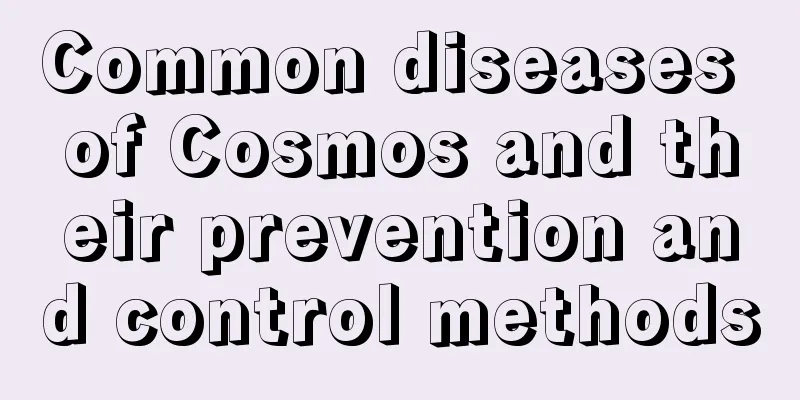Common diseases of Cosmos and their prevention and control methods

Common diseases of Cosmos: leaf spotSymptomsThere are oval and long light reddish-brown spots on the leaves, surrounded by chlorotic circles, which later expand into large irregular patches with black spots on them. Prevention and treatment methodsRemove diseased leaves and spray pesticides in time. It can be sprayed with 500 times diluted 50% thiophanate wettable powder. Common diseases of cosmos: powdery mildewSymptomsThe diseased parts are leaves, young stems, flower buds and flower buds, etc. The obvious feature is the presence of a grayish-white powdery mold layer (conidia and mycelium of the pathogen) on the diseased area. The growth and development of the affected plants are stunted, the leaves are twisted, and they cannot bloom or the flowers become deformed. When the disease is severe, the leaves dry up and the plant dies. Pathogen analysisThe pathogen of powdery mildew is Erysiphe graminis, which belongs to the subphylum Ascomycota. Mycelium grows on both sides of the leaves, conidia are columnar, ascocarps are aggregated or nearly aggregated, dark brown, oblate, accessory filaments are unbranched or irregularly branched, curved, asci are long or short ovate, and ascospores are oval or elliptical. Prevention and treatment methodsApply more phosphorus and potassium fertilizers appropriately, and pay attention to ventilation and light transmission. Prune off seriously diseased plants or seriously diseased parts promptly, bury them deeply or burn them to eliminate the source of bacteria. If necessary, spray 1500 times diluted 15% triadimefon wettable powder at the early stage of the disease. Common diseases of Cosmos: Botrytis cinereaSymptomsThe seedlings infected with gray mold are light in color, and the leaves and petioles are grayish white and water-soaked. The tissues soften and rot, and gray mold grows on the surface when the humidity is high. Young stems often initially develop irregular water-soaked spots at the base of the petiole, which quickly become soft and rotten, and then shrink or break. Finally, the diseased seedlings rot, wither and die. Prevention and treatment methodsManually remove diseased leaves or apply pesticides. The agent can be sprayed with 1000 times diluted 70% methyl thiophanate wettable powder. |
<<: Common diseases and pests of tea and their control methods
>>: Common diseases of Jianlan and their prevention and treatment methods
Recommend
What are the benefits of carbendazim for watering flowers? Can carbendazim be sprayed on all flowers?
Benefits of carbendazim for watering flowers Wate...
How often should I water the soil-grown lucky bamboo?
1. How often should you water it? There is curren...
When is the best time to plant noodles?
Noodle vegetables are a wild vegetable that has b...
How to trim lilac flowers to make them look beautiful
When is the right time to prune lilacs? Lilac pru...
Is Datura poisonous? Pictures of Datura flowers
1. Is it toxic? It is an annual plant belonging t...
Open-field cultivation technology of strawberry
Open-field strawberry cultivation is the most bas...
Should I use a large or small pot for Tiger Pilan?
Should I use a large or small pot for Tiger Pilan...
Is the dragon claw a shade-loving or sun-loving plant?
Does Dragon Claw prefer shade or sun? Dragon claw...
The efficacy and function of peacock wood
Common uses of peacock wood Ornamental use As an ...
Plants that have radiation protection effects
Plants that have radiation protection effects cac...
If you grow a pot of it in your living room, all the odors will disappear and the fragrance will make your neighbors envious!
Jasmine The fragrance of jasmine cannot be imitat...
Carnation seedling growth process
1. Sprouting and taking root The carnation seedli...
Mulberry growth environment conditions and characteristics
Mulberry tree growth environment conditions and r...
Is golden chrysanthemum poisonous?
1. Is it toxic? Golden chrysanthemum is non-toxic...
When is oat harvested?
The growth of oats has relatively high requiremen...









